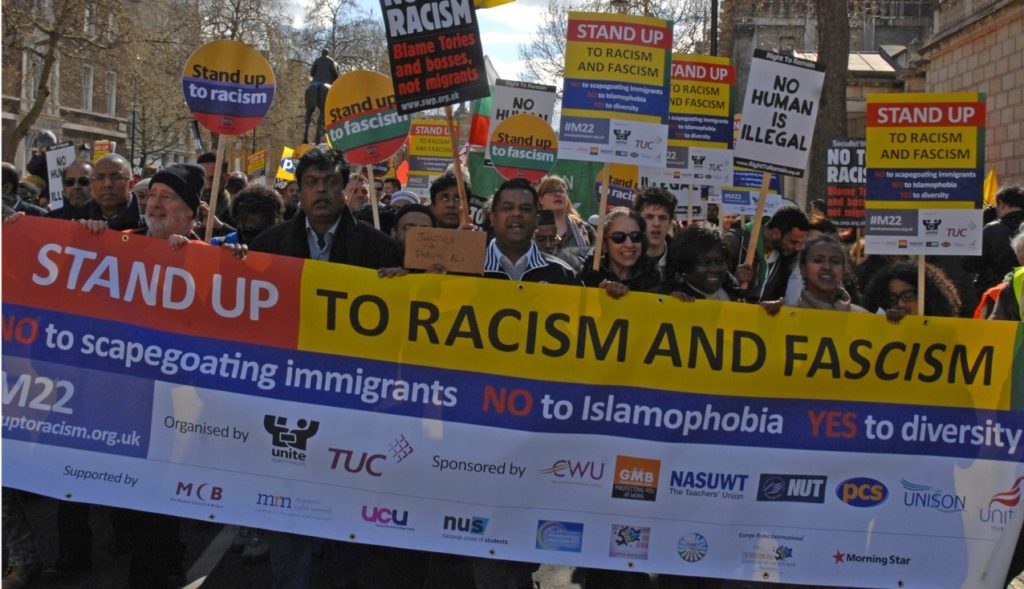One of the most difficult topics to discuss in a society is racism. A daily reality to some, relative to others. Each year on March 21st there is The International Day against Racism and Discrimination. This day received again little attention in the media and no attention at all by politicians. However, something unusual happened in Belgium where the hashtag #DailyRacism was trending on top on Twitter.
Thousands of Belgians with migrant background shared their experiences of racism and discrimination on Twitter and Facebook using the hashtag #DailyRacism.
Many Belgians were deeply shocked when reading the tweets and the stories on Facebook. But there are also some who do not believe that racism exists. Others claim that racism is the responsibility of the victims.
Even more people find that racism is relative. Bart De Wever argued this on Terzake, a Flemish TV program on 23 March. De Wever is the leader of N-VA, the biggest political party in Belgium. He is considered the most important politician in the country.
Yet, racism exists and Belgium has a particularly large problem with it. There is no other country in Europe where fewer migrants are active in its labor market. It also has the highest inequality rate within the education system.
Global issue
Racism is an issue all over the globe. Europe is not excluded; from Greece to the UK, racism is reported to be growing, and in countries such as Ireland it is even doubling. The first and largest survey on racism in Europe in 2009 by the European Union Agency for Fundamental Rights (FRA) showed alarming figures that EU politicians have not taken sufficiently seriously so far.
55% of immigrants surveyed by the FRA believed that discrimination on ethnic origin is widespread in their country. 37% said that they have been discriminated in the past 12 months. However 82% did not report their most recent experience of discrimination. FRA states that “Thousands of cases of racist crime and discrimination remain invisible.”
Many immigrant groups are facing racism and discrimination but the most discriminated groups are North Africans (36%), Sub-Saharan Africans (41%) and Roma. One in two Roma said that they have faced discrimination in the last 12 months.
Racism against Roma
Racism towards Roma people have historically occurred and still occurs in countries such as Slovakia, Czech Republic, Hungary, Romania, Bulgaria and Slovenia. This is not acceptable in democratic societies which claim to uphold human rights. However, the fact that all these countries successfully acceded to the EU shows that discrimination was not a priority in the accession negotiations.
Recent reports by FRA and other organizations such as the European Network Against Racism (ENAR) confirm that anti-Semitism and Islamophobia are also rising all over Europe. In fact, during the last decades we have even seen a “normalization” and acceptance of racism.
All of this raises a fundamental question: how long will the EU politicians and member states wait until they start tackling the virus of racism in Europe?
Solutions
There are solutions to this problem. We need clear laws at European and national levels that counter racism. It is not the case at the moment. For example, the national anti-discrimination law in Belgium is easily violated and too tenuous to have any veritable effect. In Belgium, the anti-discrimination law dates back to 2007. However, the social inspection has drawn up only one official report for discrimination in the labor market in 8 years.
The figures from FRA show that not only politicians are failing but also civil society. It is up to these organizations to reorganize their work on racism so that more people can find their way to them and denounce racism. To succeed, it is important to be locally strong, particularly in large cities, and work together at the European level.
Education is also of great importance. Many of us are not conscious about racism and what it means to be racist. We cannot fight racism if we are not conscious about it. To be conscious, we need to know the history of racism, from the crusades to white supremacy to colonialism. We need to become conscious of the prejudices, stereotypes and discrimination that exist and know their roots. Racism is a social phenomenon and through education we can tackle it.
As citizens, we all have a responsibility to set an example in our daily lives and speak out against racism. We should stand up to discriminatory behavior and spread a message of diversity which enhances the richness that diversity can bring about.

